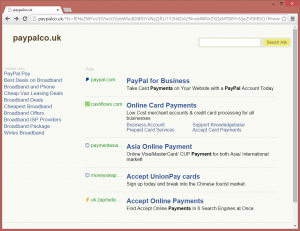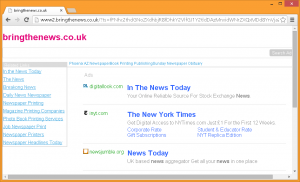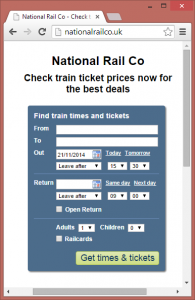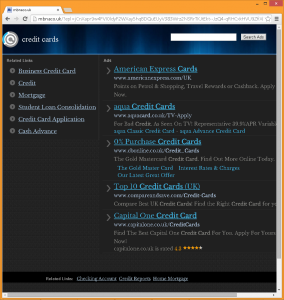Typosquatters are cashing in by registering new .uk domains which look similar to those used by existing high-traffic .co.uk websites. By simply registering a .uk domain that ends in "co", the squatters have obtained dangerously deceptive domains such as paypalco.uk and americanexpressco.uk in an attempt to steal traffic from the real domains, paypal.co.uk and americanexpress.co.uk.
Many of these typosquatting domains are being monetized by displaying ads related to the legitimate domains they are impersonating, or by using referral schemes to redirect visitors to the corresponding legitimate site — or even driving visitors towards competing services.

The typosquatting site at paypalco.uk features monetized adverts for both PayPal and its competitors.
However, the potential for abuse is not limited to making money through advertising and referral schemes. With the only difference being a single additional dot in the real domain name, this form of typosquatting could be exploited to make extremely potent phishing attacks.
First introduced in 1985, the .uk country code top-level domain (ccTLD) has only recently allowed ordinary consumers to register domains directly under .uk (such as stephenfry.uk). Before 10 June 2014, practically all UK domains had to be registered under second-level domains, which categorised the activity of the site. By far the most popular of these second-level domains is .co.uk, which is intended for commercial and general use.

Even the BBC has been targeted: www.bbcco.uk
redirects browsers to a sponsored listings page at bringthenews.co.uk
To limit the most obvious potential for domain squatting, existing owners of .co.uk domains were given automatic rights to the corresponding .uk domain (for example nationalrail.uk) on 10 June 2014, providing there was no other equivalent .org.uk, .me.uk, .net.uk, .ltd.uk and .plc.uk domain in existence. The reservation period runs for a period of five years, during which time no other party can register the domain, even if the rightful party chooses not to.
However, these measures are inconsequential to the typosquatters, who seem to have found no barriers in registering deceptive domains such as nationalrailco.uk, barclaysco.uk and hsbcco.uk. The latter two deceptive domains are registered to a corporation in Sweden, and currently display a set of sponsored listings with titles such as "Need a New Bank Account?". Other registered domains which target high-traffic financial institutions include nationwideco.uk, lloydsbankco.uk, bankofscotlandco.uk, halifax-onlineco.uk, natwestco.uk, and westernunionco.uk.
The potential for financial fraud is immense, particularly as many online banking transactions are now carried out using mobile devices, on which typographical errors are naturally more common.
Some of the .uk typosquatting sites are clearly optimised for use on mobile devices, such as nationalrailco.uk, which displays a small form to search for train tickets. However, rather than taking users to the real National Rail website at nationalrail.co.uk, the search form uses the TradeDoubler affiliate scheme to monetize the typo-traffic by directing users to a train ticket sales website at thetrainline.com.

Some co.uk typosquatting sites are optimised to be viewed on mobile devices.
Flagrant typosquatting of popular sites amongst the .uk top-level domain is rife. Another brazen example is mbnaco.uk, which is clearly trying to scoop up typo-traffic from credit card provider MBNA, which uses mbna.co.uk for its main website. The typo domain presents adverts which invite visitors to apply for credit cards at various competitors, including American Express and Capital One.

Sponsored listings for competing credit card providers on mbnaco.uk
Companies concerned about typosquatting attacks against their customers can use Netcraft's Fraud Detection service to pre-emptively identify fraudulent domain name registrations. Domain name registrars can use Netcraft's Domain Registration Risk service to analyse the likelihood of a new domain being used for fraudulent activity.
Continue reading...
Many of these typosquatting domains are being monetized by displaying ads related to the legitimate domains they are impersonating, or by using referral schemes to redirect visitors to the corresponding legitimate site — or even driving visitors towards competing services.

The typosquatting site at paypalco.uk features monetized adverts for both PayPal and its competitors.
However, the potential for abuse is not limited to making money through advertising and referral schemes. With the only difference being a single additional dot in the real domain name, this form of typosquatting could be exploited to make extremely potent phishing attacks.
First introduced in 1985, the .uk country code top-level domain (ccTLD) has only recently allowed ordinary consumers to register domains directly under .uk (such as stephenfry.uk). Before 10 June 2014, practically all UK domains had to be registered under second-level domains, which categorised the activity of the site. By far the most popular of these second-level domains is .co.uk, which is intended for commercial and general use.

Even the BBC has been targeted: www.bbcco.uk
redirects browsers to a sponsored listings page at bringthenews.co.uk
To limit the most obvious potential for domain squatting, existing owners of .co.uk domains were given automatic rights to the corresponding .uk domain (for example nationalrail.uk) on 10 June 2014, providing there was no other equivalent .org.uk, .me.uk, .net.uk, .ltd.uk and .plc.uk domain in existence. The reservation period runs for a period of five years, during which time no other party can register the domain, even if the rightful party chooses not to.
However, these measures are inconsequential to the typosquatters, who seem to have found no barriers in registering deceptive domains such as nationalrailco.uk, barclaysco.uk and hsbcco.uk. The latter two deceptive domains are registered to a corporation in Sweden, and currently display a set of sponsored listings with titles such as "Need a New Bank Account?". Other registered domains which target high-traffic financial institutions include nationwideco.uk, lloydsbankco.uk, bankofscotlandco.uk, halifax-onlineco.uk, natwestco.uk, and westernunionco.uk.
The potential for financial fraud is immense, particularly as many online banking transactions are now carried out using mobile devices, on which typographical errors are naturally more common.
Some of the .uk typosquatting sites are clearly optimised for use on mobile devices, such as nationalrailco.uk, which displays a small form to search for train tickets. However, rather than taking users to the real National Rail website at nationalrail.co.uk, the search form uses the TradeDoubler affiliate scheme to monetize the typo-traffic by directing users to a train ticket sales website at thetrainline.com.

Some co.uk typosquatting sites are optimised to be viewed on mobile devices.
Flagrant typosquatting of popular sites amongst the .uk top-level domain is rife. Another brazen example is mbnaco.uk, which is clearly trying to scoop up typo-traffic from credit card provider MBNA, which uses mbna.co.uk for its main website. The typo domain presents adverts which invite visitors to apply for credit cards at various competitors, including American Express and Capital One.

Sponsored listings for competing credit card providers on mbnaco.uk
Companies concerned about typosquatting attacks against their customers can use Netcraft's Fraud Detection service to pre-emptively identify fraudulent domain name registrations. Domain name registrars can use Netcraft's Domain Registration Risk service to analyse the likelihood of a new domain being used for fraudulent activity.
Continue reading...

